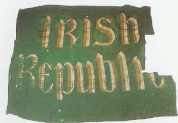If recent opinion polls are to be believed, Friday 23rd of May 2014 may turn out to be a red-letter day in the politics of the 26 counties, and by extension in the politics of the island as a whole.
For 92 years, since the narrow ratification of the Anglo Irish Treaty by Dáil Eireann under the British threat of terrible war if not voted through, the Free State has been continuously ruled by three counter-revolutionary parties – Cumann na nGaedheal-Fine Gael, Fianna Fáil and Labour – either as single-party governments or in various permutations as coalitions.
Far from creating a republic which this state is often erroneously described as, these three parties have worked assiduously to avoid creating any of the conditions that would allow the state to take the form of a republic. Instead, what these parties have created and presided over has been a theocratic state for much of the past 92 years, combined with a combination of plutocracy and oligarchy. That is entirely at odds with the aims of the 1916 Revolution as espoused in the Proclamation of the Irish Republic, endorsed and expanded by the National Programme of the First Dáil in 1919.
The culmination of all of those years of misgovernment has been to produce a failed state. The price for that has been counted in untold misery for millions of women, children and men. The prize, for the few, has been to maintain a privileged class who divided the spoils between themselves, making sure to maintain those three parties as their permanent political arm.
Current opinion polls, taken in the run-up to the European and Local elections, and the two bye-elections, indicate that support for Sinn Féin, smaller socialist and republican parties, and independents of various hues stands at between approximately 43% and 50%, depending on the poll. If that tallies with the count results then it indicates that majority support for the three parties of permanent misgovernment has either disappeared or has been very considerably weakened. With a General Election to take place probably before the end of 2015 such a result, if built on by the alternative political forces in the intervening period, could lead to the potential for a fresh political dispensation in the form of an ideologically different government to what we have known since quasi-independence.
With an electorate that appears increasingly willing to try something different, it is important that that potential is exploited by parties and individuals who claim to be different, who seem to offer a different ideology, a different vision of the future in political, economic and social terms to that imposed by the counter-revolutionary parties.
Whether those parties and individuals ultimately measure up is not the immediate issue. What will be important about a result that would show a marked abandonment of support for the combination of Fine Gael, Fianna Fáil and Labour, and a shift towards other possibilities, will be the psychological effect it can have on the way people think about possibilities for the future.
If there is a decisive shift, the sky won’t fall. Life will go on, god will not smite the unbelievers, the seas won’t rise to engulf the island, the economy won’t collapse. Instead, more people may become emboldened, more engaged, more optimistic. It is important to use Friday’s vote to help that process. The most certain way is to try to ensure as many defeats as possible for those three parties of permanent misgovernment by voting for potential winners among the alternative parties of the broad left including republican parties, and worthy and potentially successful independents.
Inflicting defeats on the counter-revolutionary parties will lead to them changing their strategies – but not their core beliefs although they will try to spin new messages to hold ground. But that will be finger-in-the-dyke stuff. Once the first crack appeared in the Berlin Wall there was no going back.
“There is a crack, a crack in everything. That’s how the light gets in.”
Vote! Vote strategically! Say goodbye to counter-revolution. Say hello to the Republic.
